Dental Health Basics: What You Need to Know
Good dental health isn’t just about a bright smile – it’s about staying comfortable, eating well, and avoiding costly procedures later. Most people think brushing twice a day is enough, but there’s a lot more you can do for your teeth and gums without spending a fortune.
Everyday Habits for Strong Teeth
Start with the simple stuff. Use a soft‑bristled toothbrush and replace it every three months. A pea‑sized dab of fluoride toothpaste does the trick – more isn’t better and can wear enamel down. Spend at least two minutes brushing, making sure to cover all surfaces, especially the back teeth where food loves to hide.
Flossing often feels like a chore, but it removes plaque your brush can’t reach. If string floss is a pain, try floss picks or a water flosser – they work just as well and feel easier for many people. Rinse with an alcohol‑free mouthwash to freshen breath and kill bacteria, but don’t rely on it as a substitute for brushing.
Watch your diet. Sugary drinks, sticky candies, and frequent snacking give bacteria more fuel, leading to cavities. Swap soda for water, and reach for crunchy vegetables like carrots, which naturally clean teeth while you chew.
When to See a Professional
Even with top‑notch home care, regular dentist visits are a must. Most dentists recommend a check‑up every six months, but if you notice bleeding gums, persistent bad breath, or sharp tooth pain, book an appointment sooner. Early detection of gum disease or a small cavity can save you from major work later.
If you’re considering cosmetic work – like teeth whitening or orthodontics – talk to your dentist first. They can assess your oral health and advise the safest, most effective options. For those worried about costs, ask about payment plans or NHS dental options, which often cover essential treatments.
Finally, don’t overlook the link between dental health and overall wellbeing. Poor oral hygiene has been linked to heart disease, diabetes, and even headaches. Keeping your mouth clean is an easy step toward a healthier body.
Bottom line: consistent brushing, flossing, smart food choices, and timely professional care are the pillars of strong dental health. Stick to these habits and you’ll keep your teeth feeling good and looking great for years to come.

How Long Do Tooth Implants Really Last in the UK?
Discover the lifespan of tooth implants and learn how long they typically last in the UK. Explore factors that affect their durability and get practical tips on extending their life. Find out what signs indicate when an implant may need attention and how to properly care for it. Gain insights into the average timeline for implant replacement and the best practices for maintaining your dental health.
Categories: Dental Implants UK
0

Key Insights into Who Should Avoid Dental Implants in the UK
Dental implants are a popular solution for replacing missing teeth, yet they aren't suitable for everyone. Certain medical conditions, habits, and lifestyle choices can render a person unsuitable for this dental procedure. It's crucial to understand who should avoid implants to prevent complications. This guide provides insights and tips on who should seek alternative dental treatments instead.
Categories: Dental Implants UK
0
